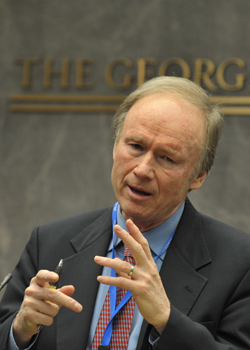Professors Mark Rosen and Christopher Schmidt recently posted a new article to SSRN titled Why Broccoli? Limiting Principles and Popular Constitutionalism in the Health Care Decision (61 UCLA L. Rev., forthcoming). Here is the abstract:
Crucial to the Court’s disposition in the constitutional challenge to the Affordable Care Act (ACA) was a hypothetical mandate to purchase broccoli, which Congress never had considered and nobody thought would ever be enacted. For the five Justices who concluded the ACA exceeded Congress’s commerce power, a fatal flaw in the government’s case was its inability to offer an adequate explanation for why upholding that mandate would not entail also upholding a federal requirement that all citizens purchase broccoli. The minority insisted the broccoli mandate was distinguishable.
This Article argues that the fact that all the Justices insisted on providing a limiting principle – which was the demand underlying the broccoli hypothetical – was perhaps the most notable, precedent-breaking aspect of its landmark decision. As the Article shows, when confronted with novel constitutional questions the Court almost always uses narrow, “localist” reasoning that analyzes only the government’s actual action. Indeed, the Court ordinarily explicitly declines to provide a limiting principle until it has heard several cases from which it can confidently deduce one.
The Article provides the first comprehensive analysis of how, and why, the broccoli hypothetical ultimately proved so deeply consequential. Outside the courts, where the constitutionality of the mandate was robustly debated, the broccoli hypothetical served to highlight the potential liberty costs of the Act. In the courts – where, strictly speaking, the doctrinal question involved not personal liberty but congressional power – broccoli ensured that liberty costs would be a significant element of the constitutional analysis, and it also generated a perceived need to identify a limiting principle. In short, broccoli was a critical bridging mechanism that brought together a popular constitutional movement mobilized against the Affordable Care Act and the constitutional challenge taking place in the courts.
We conclude with a normative assessment of this kind of relatively direct extrajudicial influence on the courts. We argue that while popular constitutional theory might justify the majority’s novel liberty-centered approach to congressional power, it cannot warrant the Court’s unusual break from localist legal reasoning. The Court’s premature engagement with limiting principles bypassed the benefits of its ordinary incremental, case-by-case analysis, and circumvented institutional synergies that can generate superior and more democratically legitimate outcomes when courts and legislatures work together, over time, to flesh out constitutional judgments.
Download the article from SSRN here.



Leave a Reply